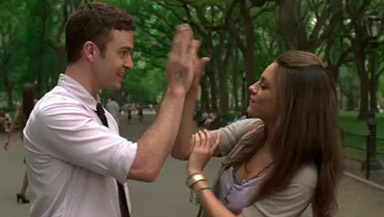Movie vs. Movie: Friendly and Stringless
Groundbreaking? Revolutionary? Not Exactly.
By Tom Houseman
April 23, 2012
Friends with Benefits
Friends with Benefits takes a different approach than its stringless counterpart. If Strings pushes the boundaries of what a rom-com is expected to be, then you could say that Friends twists them. It understands all of the tropes and cliches of its genre and effectively subverts them, undercutting audience expectations by moving the story in unexpected ways. Considering that most rom-coms build towards the couple sleeping together, the idea that the plot is built around the couple sleeping together is itself subversive (if not as shocking and groundbreaking as either of these movies think it to be), which makes the use of this plot to turn the traditional rom-com on its head an effective one.
If only this form of subversion didn't come off as quite so lazy. Friends knows that it is clever, that it is intentionally toying with the genre, and it decides to be as obvious about this as possible, shouting “look how clever and different I am” over and over. Part of the way the movie plays with genre expectations is by having its protagonists, Dylan and Jamie, watch scenes from a fake romantic comedy starring Jason Segel and Maya Rudolph. This is an easy way for the film to point out how much better it is than most rom-com trash, but the scenes that we see are too obvious and simple to be funny. The film consistently goes for the easy laugh, seemingly confusing obvious with clever.
Like Strings, Friends often comes off as fake, but the difference is that Friends embraces and flaunts how fake it is. In the opening scene we see Dylan and Jamie get dumped by their respective significant others, and in both cases the other (Andy Samberg and Emma Stone) state directly what is wrong with the two characters: Dylan chooses his work over everything else and Jamie is too idealistic about love and emotionally damaged. This extreme bluntness is a refreshing change of pace, and sets the tone for the way the characters discuss their romantic lives. They are so straightforward that it comes off as unrealistic, but because the film celebrates this trait rather than covers it up, it highlights that this film is intended to be a twist on the traditional rom-com.
Of course, if the characters felt fake the conceit would collapse under its own weight, because there needs to at least be a sense that we are watching people worth caring about. In that respect Friends is far more successful than Strings. The characters in Friends are delicately crafted and wonderfully detailed, which makes them feel very real. It is the absurdity of their character traits that lend them an authenticity. Dylan's propensity to rant about how easy planes are to land is so ridiculous that you can imagine sitting next to someone exactly like that on a plane and thinking they are kind of an idiot. Friends is not determined - as Strings seems to be - to make its characters as likeable as possible. Rather, giving the characters real flaws makes them more relatable and easy to root for.
The supporting characters also prove to be more than just generic rom-com sounding boards. Woody Harrelson's gay sports editor is a delightfully quirky character who is so different from Dylan that he brings his own unique energy to the scene. Patricia Clarkson, as Jamie's mother, is essentially a more outrageous version of her mother role in Easy A, but she is so entertaining that you can forgive her for being slightly derivative. What is important is that both of these characters have their own lives outside of the plot of the film; you do not get the sense that they disintegrate he moment they are off screen. In addition, seeing Dylan's family gives the film a weightiness that is rare for the genre. Dylan's father is suffering from Alzheimer's, and the film uses these scenes to tell us that while romance is fun and exciting, that there are far more important matters in our lives than who we happen to be sleeping with.
The biggest problem with Friends is not just that the film itself could be so much better, but that we have recently seen a similar film that was so much better. Just a few years ago Will Gluck directed Easy A, which does to teen movies what he attempts to do with rom-coms in Friends, turning expectations on their head and giving us something new and exciting. Friends can't quite get the rom-com on its head, never putting enough force into it, and leaves it instead on its side, flapping about like a fish. This is certainly more entertaining than a rom-com planted firmly on its feet, but it leaves piles of potential on the table, and suffers in comparison to the vastly superior Easy A.
Continued:
1
2
3




